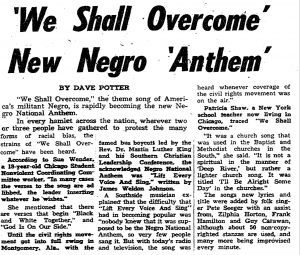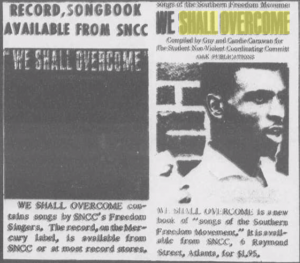On April 4th, 2011, in Madison, WI, Reverend Jesse Jackson spoke at a rally honoring Dr. Martin Luther King Jr. At 0:15 in the video below, Rev. Jackson begins singing (and encouraging others to sing) the protest song “We Shall Overcome,” a song that has now become an anthem that is frequently sung at anti-racist rallies and marches, specifically those associated with Black Lives Matter.
This isn’t the first time a movement has used “We Shall Overcome” as a protest song. In September 1963, the Chicago Daily Defender published an article titled, “’We Shall Overcome’ New Negro ‘Anthem.’”
The first sentence of the article reads:
“’We Shall Overcome,’ the theme song of American’s militant Negro, is rapidly becoming the new Negro National Anthem.” 1.
The article continued explaining how this song had been used for decades, but was popularized in relation to race with the invention of the television and radio; after these inventions, the song was heard every time the Civil Rights Movement was on the air.
“We Shall Overcome” became such a staple for the Civil Rights movement that songbooks were created using the title as their own. The following is an advertisement from the Student Non-Violent Coordinating Committee magazine in 1964, based out of University of California, Berkeley, for a songbook called “We Shall Overcome,” which is full of various protest songs to encourage peaceful protest in the height of the Civil Rights Movement.
However, it didn’t start as a protest song. The piece was originally a gospel song, composed by Reverend Charles Albert Tindley in 1900. Interestingly enough, the lyrics that are popular today (as well as in the 1960’s during the Civil Rights Movement) were written by a white musician, Pete Seeger. Seeger was not only a songwriter, but an activist, and worked to popularize “We Shall Overcome” by teaching the song at rallies and protests. It could be said that Seeger is one of the main reasons “We Shall Overcome” is such an icon for anti-racism protests across the country.
In the 21stcentury, activists criticize “We Shall Overcome,” as it never specifies when this action will occur. A Black Lives Matter activist, Zellie Imani, attended a protest after the fatal shooting of an unarmed, 18-year-old African American boy named Michael Brown by a white police officer in 2014. He recalls Rev. Jackson, the same singer from the video I started with, tried to encourage protesters to sing “We Shall Overcome.” This time, however, he was unsuccessful.
“The song doesn’t tell us when we shall overcome. It is saying that we will overcome someday. And what we in the streets wanted, we wanted justice now,” Imani states in an article for CNN. 3
Instead of “We Shall Overcome,” people started chanting Kendrick Lamar’s “(We Gon’ Be) Alright,” reflecting a shift in the change of attitude towards the outcomes: no more is it about overcoming, but about igniting change, which this video does with it’s images of police shooting and fires, among other images.
And his concerns don’t even address the fact that we use a white musician’s words in “We Shall Overcome.” While Seeger was an activist and white ally to the Civil Rights Movement, using his words could be taking away from Rev. Tindley. In an extreme interpretation, it could even be seen as a method of taking the song and claiming as a white invention, similar to how George Pullen Jackson takes African American spirituals and folksongs in his book White and Negro Spirituals, molding the songs to attempt to persuade readers that these folksongs have white roots and are, therefore, white songs.4 Again, it is extreme, but why are we using a white songwriter’s lyrics for songs about promoting racial change?
As generations change, as do the wants and desires for equality. Maybe in the 1960’s, it was about overcoming, making “We Shall Overcome,” the appropriate song to sing. But maybe now, it’s about more than overcoming; maybe now, it’s about protesting inequality and promoting change. With that, maybe it’s time to change protest songs.
Bibliography
(1) Potter, Dave. “‘We Shall Overcome’ New Negro ‘Anthem’.” Chicago Daily Defender (Daily Edition) (1960-1973), Sep 17, 1963. https://search.proquest.com/docview/493990555?accountid=351.
(2) “Record, Songbook Available from SNCC.” Student Non-Violent Coordinating Committee (1961-1972), Feb 11, 1964. http://www.rockandroll.amdigital.co.uk/Contents/ImageViewer.aspx?imageid=776614&searchmode=true&hit=first&pi=1&themeF=Civil+Rights+And+Race+Relations&vpath=searchresults&prevPos=704212.
(3) Hare, Breeanna. “This is what protest looks like.” CNN.com. https://www.cnn.com/2017/04/20/us/soundtracks-protest-music-evolution/index.html (Oct 8, 2019).
(4) Jackson, George Pullen. “White and Negro Spirituals.” JJ. Augustin Publisher, New York. 1943. https://drive.google.com/file/d/0BxQzWOgr8AurNWx1elpSb1dZcjdIY2JOMm9fRm5tVWpUQnBJ/view.
(5) KendrickLamarVEVO.”Alright.” Youtube, Oct. 8, 2019. https://www.youtube.com/watch?v=Z-48u_uWMHY.
(6) Tona Williams. “Rev. Jesse Jackson “We Shall Overcome” Madison, WI April 4, 2011 (union solidarity).” Youtube, Oct. 8, 2019.


